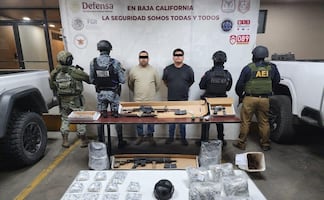On May 13, Economy Minister Graciela Márquez said Mexico’s re-opening would be “gradual, orderly and cautious,” and that by May 18, industries like construction , mining , and car and truck manufacturing would be allowed to resume after the country implemented a lockdown amid the COVID-19 pandemic.

Mexico’s top advisory body on the COVID-19 pandemic, the General Health Council , said it had decided to classify those industries as “ essential activities, ” which are allowed to continue working during a lockdown aimed at halting the spread of the novel coronavirus.
On May 12, Mexican health officials reported its largest single-day hike in COVID-19 case numbers, with 1,997 new cases and 353 deaths, bringing the total to over 38,000 COVID-19 cases and almost 4,000 deaths .

Officials have acknowledged the actual infection numbers are higher. Moreover, Mexico has done little testing , with about 120,000 coronavirus tests reported in a country of almost 130 million. That is equivalent to only about 0.6 people per 1,000 inhabitants tested, the lowest rate in the Organization for Economic Cooperation and Development .
That will make it hard to judge whether the re-opening will risk a renewed upsurge in cases.
In regads to schools, Education Minister Esteban Moctezuma said children won't return to school until its safe for them.
Universities
, spas, gyms, bars, and clubs would resume their activities in September.
Recommended: COVID-19 Live Updates: Mexico
Additionally, Mexico has been under pressure from U.S. officials t o reopen auto plants because, without them, integrated supply chains would make it hard for plants in the U.S. and Canada to reopen.
Christopher Landau
, the U.S. ambassador to Mexico, launched a Twitter campaign last month, writing “There are risks everywhere, but we don’t all stay at home for fear we are going to get in a car accident (...) The destruction of the economy is also a health threat.”
Ellen Lord, U.S. undersecretary of defense for acquisition and sustainment, recently said that Mexican plant closures were affecting U.S. companies.
But the pressure for reopening is building as well in Mexican states where the lockdown has caused huge job losses .
Nationwide, Mexico has lost around 500,000 jobs due to the pandemic, and the auto industry appears eager to get back to work.
Last week, Volkswagen de Mexico said it is planning to reopen its assembly plant in Puebla and its engine factory in Guanajuato state on June 1.
General Motors
said it hadn’t fixed “an exact date” for reopening its plant, also in Silao, Guanajuato, but some workers there reported getting notices to report for work on May 18. Ford said, “We are waiting to receive (government) approval to operate.”
Mexican officials also said other businesses and schools would begin to reopen. Marquéz said that schools and businesses would be allowed to reopen in about one-tenth of Mexico’s municipalities that have no recorded COVID-19 cases. There are about 269 such “municipalities of hope,” that neither have active cases in their territory nor adjoining municipalities. They are largely located in rural areas in north-central and southeastern Mexico.

A new, four-color coding system will be implemented on June 1, which indicates what activities are allowed. But López Obrador said every state will decide whether or not to implement the new measures. PAN governors said they will not reopen several activities until there is a decrease in contagions.
Recommended: Up to eight top Candidates for COVID-19 vaccine exist
Mexico City,
which has been the most affected state and where most of the hospitals are full, announced that manufacturing and construction can restart on June 1. Restaurants and department stores can open at one-third capacity starting June 15, and sports events can be played without spectators. Schools will re-open sometime in August.
The new measures are called the “New Normal” and are divided into three stages.

Stage 1
: 269 municipalities located in Chiapas, Chihuahua, Guanajuato, Guerrero, Hidalgo, Jalisco, Michoacán, Nuevo León, Oaxaca, Puebla, San Luis Potosí, Sonora, Tamaulipas, Veracruz, and Yucatán will reopen on May 18.
Stage 2
: Construction, mining, and factories will resume their activities between May 18 and May 31.
Stage 3
: Social, educational, and economic activities will resume on June 1.
Furthermore, the General Health Council approved four new agreements to lift the lockdown:
1. Construction, mining, and manufacturing were labeled essential activities
2. They lifted the ban on school and work activities in 269 municipalities
3. All companies and commerces must implement health measures
4. Starting on June 1, the Health Ministry will issue a weekly scheme for each state. It will indicate which economic, educational, and social activities are allowed
Recommended: Mexico has flattened the COVID-19 curve
gm
Noticias según tus intereses
[Publicidad]
[Publicidad]














